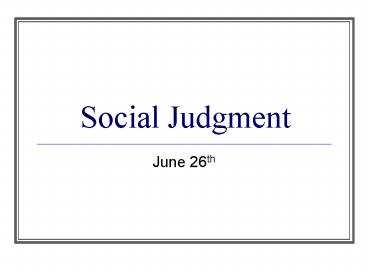Social Judgment PowerPoint PPT Presentation
1 / 14
Title: Social Judgment
1
Social Judgment
- June 26th
2
In general
- Social judgment is sometimes quite good, but does
have limitations we will focus on the
limitations - Judgment can only be as reliable as the
information on which it is based. - Our focus is on the process rather than the
outcome - Bad processes can lead to good outcomes and vice
versa - People do not react or judge the actual person or
the situation, but their mental representation of
it (the importance of construal)
3
We can only judge with the information we have
- To have unbiased judgment you need unbiased
information - Pluralistic ignorance - misperception of a group
norm that results from observing people who are
acting at variance with their private beliefs out
of a concern for the social consequences
behavior that reinforces the erroneous group
norm
4
I know because I saw it I was there
- Memory biases
- Human memory is fallible, even when were very
sure of what we saw, experienced, etc. - Flashbulb memories
- vivid recollections of the moment one learned
some dramatic, emotionally-charged news - What about secondhand experience?
- Is my judgment based on my friends tall tales?
5
Biases in secondhand information
- Sharpening
- emphasizing important or more interesting
elements in telling a story to someone else - Leveling
- eliminating or deemphasizing seemingly less
important details when telling a story to someone
else - Ideological distortions
- Distortion in media
- Perceptual vigilance
6
Presentation matters!
- We can judge the same objective information in
different ways based on how it is presented - Framing effects
- the influence on judgment resulting from the way
information is presented, including the order of
presentation - Spin framing
- Gain/loss framing
- Order effects
- Primacy recency effects- disproportionate
influence of information presented 1st last,
respectively
7
Asian Disease Problem
- Imagine that the U.S. is preparing for the
outbreak of a rare Asian flu, which is expected
to kill 600 people. Two alternative programs to
combat the disease have been proposed. Assume
the exact scientific estimates of the
consequences of the programs are as follows - If Program A is adopted, 200 people will be saved
- If Program B is adopted, there is a 1/3rd
probability that 600 people will be saved and a
2/3rds probability that no people will be saved. - Which do you prefer?
Now consider these two alternative scenarios
- If Program C is adopted, 400 people will die.
- If Program D is adopted, there is a 1/3rd
probability - that nobody will die, and a 2/3rds probability
that - 600 people will die.
- Which do you prefer?
8
Prior Knowledge is Very Important
- We employ both bottom-up and top-down processes
- Bottom-up processes mental processing in which
one takes in and forms conclusions on the basis
of the stimuli encountered in ones experience - Top-down processes mental processing in which
one filters and interprets new information in
light of preexisting knowledge and expectations
9
Prior Knowledge
- The brain is organized information resides in
knowledge structures - coherent configurations (schemas, scripts,
frames, prototypes, or personae) in which related
information is stored together - schema - a knowledge structure consisting of any
organized body of stored information - Attention
- Inference contrual
- Memory
- Encoding
- Retrieval
10
Remember Heuristic vs. Systematic?
- System 1
- Automatic
- Effortless
- Parallel processing
- Association-based
- emotional
- System 2
- Conscious
- Requires effort
- Serial Processing
- Rule-based
- Affect-neutral
11
Heuristics (and biases)
- Heuristic - intuitive mental operations that
allow us to make a variety of judgments quickly
and efficiently - Availability heuristic - the process whereby
judgments of frequency or probability are based
on the ease with which pertinent instances are
brought to mind - Representativeness heuristic - the process
whereby judgments of likelihood are based on
assessments of similarity between individuals and
group prototypes, or between cause and effect
12
Instances of availability
- Were there more men or women on the list?
- Is Gretchen a mean professor?
- How dangerous is the world?
- Media exposure encourages view of world as
dangerous place - How much did you contribute to the group effort?
13
Representativeness
- Linda is 31 years old, single, outspoken, and
very bright. She majored in philosophy. As a
student, she was deeply concerned with issues of
discrimination and social justice, and also
participated in anti-nuclear demonstrations. - Rank from 1 to 4 (1 is most likely)
- Linda protests globalization/WTO
- Linda is a bank teller
- Linda is a social psychologist
- Linda is a bank teller who protests globalization
- Similarity is an easy judgment, likelihood is
hard
14
Other instances of representativeness
- Similarity between causes and effects
- Homeopathy
- Stereotyping
- Are you likely to mug me?
- Do you fit my prototype of a mugger?

